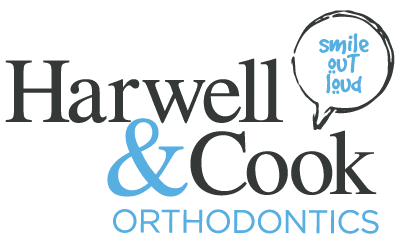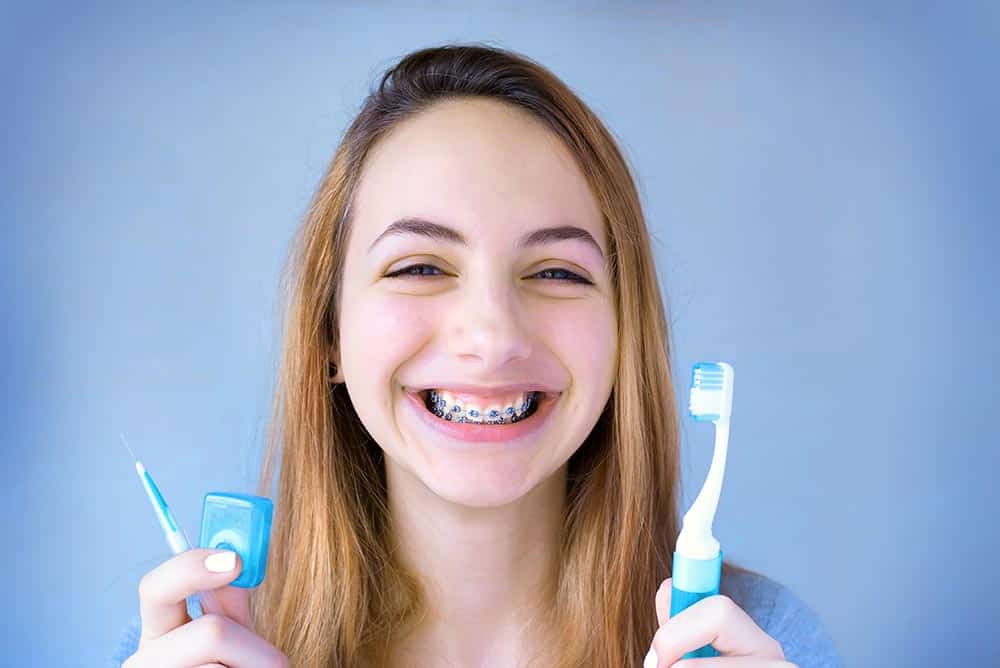While braces are a fantastic way to build your most confident smile, there are also a few slightly less fantastic aspects of having braces.
Hint hint – the main one is a little “stinky”.
Any guesses?
That’s right, bad breath.
Bad breath is caused by bacteria that gets trapped in your mouth, and while it can be something no one wants to talk about, it’s actually very normal. When you have braces, food can easily get stuck in your brackets creating the perfect conditions for bacteria to grow.
Don’t worry though, there are several things you can do to combat stinky breath.
Here are the top five tips Dr. Harwell and Dr. Cook tell their patients to help them achieve their freshest breath with braces.
Brush and floss regularly
Maintaining your oral hygiene is extremely important when you have braces, especially if you want to combat bad breath. After you eat, trapped food particles linger in your braces and feed the bacteria in your mouth. Brushing and flossing when you first wake, after every meal, and before bed will free trapped food particles from braces, wires, bands, and retainers. Routinely skipping your brushing and flossing regimen will result in bacteria growth, plaque build-up, and ultimately, bad breath.
Flossing with braces is a little more meticulous than without, but it is vital to removing the food from between your brackets. You can use traditional floss, a floss threader, or a Waterpik to remove food from your braces. Take your time and start by threading the floss between your teeth and the main wire, then wrap the end of the floss around your index finger. Once the floss is in place, gently move it between your teeth. After you have removed any remaining food particles, carefully remove the floss and repeat throughout your mouth.
Make sure you are gentle while flossing so you don’t accidentally knock a wire loose. If a wire becomes loose, call your orthodontist as soon as possible and they will set up an appointment to fix it.
Use the right mouthwash
Gargling with mouthwash after you brush and floss can remove any small food particles left from your last meal. Make sure you purchase an antibacterial mouthwash and swish it for 30 seconds after brushing for the best results.
If you have sensitive teeth, there are many types of mouthwash on the market made specifically for sensitive teeth.
Regardless of the mouthwash brand or kind you choose, the key is to remember to consistently use mouthwash in your oral hygiene routine to remove tiny food particles and keep your breath smelling fresh.
As always, if there are any questions about what is best for you and your treatment plan, asking your orthodontist’s office is a great way to acquire the best answer for you.
Stay hydrated
Hydration is vital to regulating body temperature, preventing infections, delivering nutrients to your cells, and maintaining proper organ function. It is also crucial to sustaining your mouth’s saliva production. Saliva helps prevent bacteria from growing in your mouth by naturally removing particles and debris.
When you have braces, food particles often get stuck in your brackets and around your teeth. These food particles create the perfect conditions for bacteria to grow, and that growth leads to bad breath. Staying hydrated and sustaining your saliva production helps to ward off harmful, bad-breath-causing bacteria.
In order to stay hydrated, you should drink at least six to eight cups of water throughout the day. Snack on fruits and vegetables with a high water content to help keep your body hydrated. Watermelon, cucumbers, strawberries, and celery are all delicious snacks with high water content. Make water accessible and fun by keeping reusable water bottles and straws with you on the go.
Focus on less sugary foods
Eating healthy, less sugary foods like fresh fruits and vegetables can significantly help with bad breath. Excess sugar can lead to increased bacteria growth, so limiting refined sugars can help limit bacteria growth. Another helpful tip is to avoid strong-smelling foods like onions and garlic. You don’t have to completely eliminate these foods from your diet, but limiting them will help keep your breath fresh.
Visit your dentist regularly
Even though you are now undergoing orthodontic treatments, regularly visiting your dentist is still vital to maintaining your overall oral health and hygiene. Because food particles are easily trapped in braces, you are more prone to plaque and tartar buildup during your orthodontic treatment. Bacteria, plaque, and tartar release smelly odors resulting in bad breath. Regular dental cleanings remove the sticky plaque and hard tartar that contribute to stinky breath. Not only do dental cleanings help prevent bad breath, but they also help prevent cavities, tooth decay, and gum disease.
Be sure to check in with us regularly for routine cleanings and let us know about any issues you are experiencing. If you struggle to eliminate your bad breath, let us know and we can help you find the perfect solution!
While bad breath can seem embarrassing, it is a totally normal part of the braces process that many individuals in treatment experience. We are here to help you in any way you need. If you have any questions or concerns, call our office at 806-353-3593 or (800) 7ORTHO7.
We’re here to help you achieve your healthiest, most confident smile.
Harwell & Cook Orthodontics is a family-oriented orthodontic practice with offices located conveniently throughout the Texas panhandle. We offer Invisalign and braces treatments for kids, teens, and adults in a fun and relaxing environment. To schedule your complimentary consultation, call the Harwell & Cook office closest to you.

